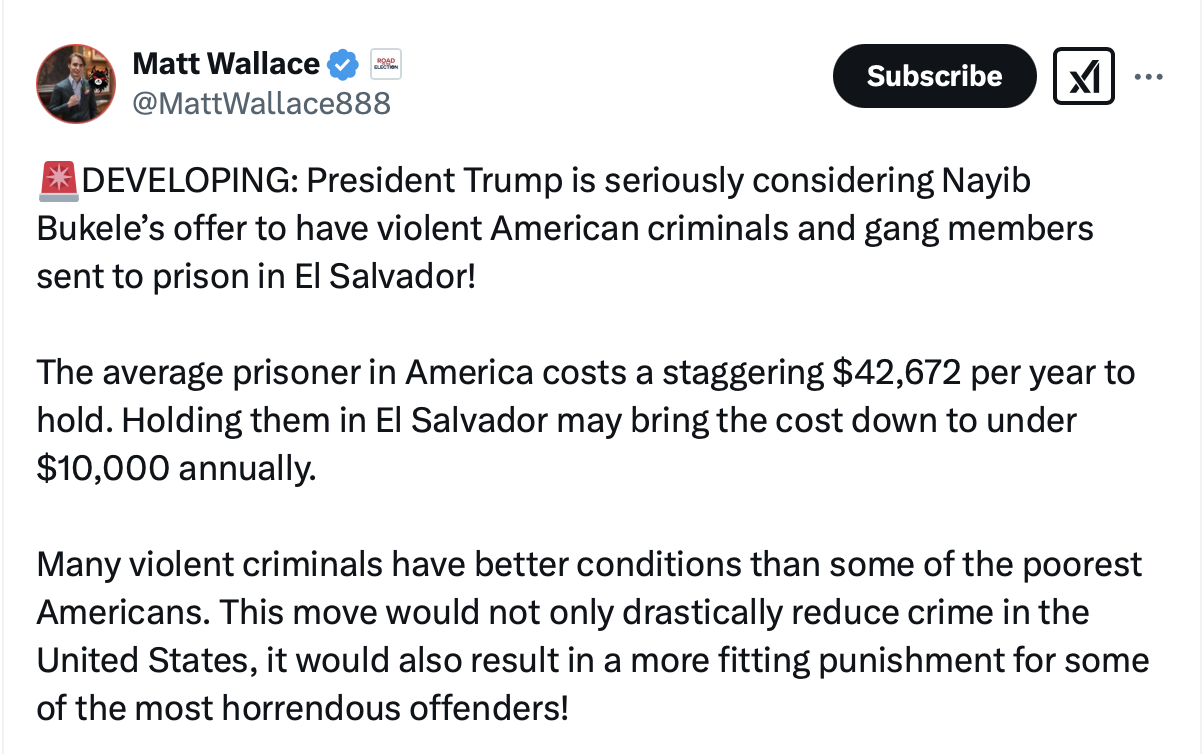A couple days ago, I brought you this report saying President Trump wanted to DEPORT US Citizens — the worst of the worst violent offenders, the people who push other people in front of oncoming subway trains.
Full details here in case you missed it:
President Trump Just Announced New Plan To DEPORT US Citizens! Let Me Explain…
I actually love that idea and I support it 100% if it's deemed legal.
Get these people the Hell out of our country!
It's actually far more charitable than my personal belief, which is to just give them the death penalty.
Here is President Trump speaking about it again today:
Trump: If it is legal, we will be sending our worst criminaIs to the rough prisons in El Salvadorpic.twitter.com/qGs7AKvPXD
— End Wokeness (@EndWokeness) February 4, 2025
And now I have a new update on the story for you....
In just a few short days, El Salvador has already responded and accepted President Trump's offer, agreeing to take in US prisoners:
BREAKING: El Salvador agrees to take in criminals of any nationality including US convicts…. This will be their new home:
— End Wokeness (@EndWokeness) February 4, 2025
Wow!
As to the fee, it costs us an average of $42,000+ per year to house the average prisoner in America, via payments to the private prison system:

Estimates say outsourcing these prisoners to El Salvador could reduce the cost to under $10,000 per year.
Talk about a win-win!
We get these horrible inhuman criminals out of our country and save $30,000 per pop?
Yes please!
You think it's fun to push people in front of oncoming subway cars?
Enjoy the rest of your life here:
I’m not sure people fully grasp what it means to send our worst criminals to El Salvador. This isn’t like sending them to a U.S. prison with cushy amenities and endless appeals. El Salvador has built some of the largest, most hardcore prisons in the world—and trust me, they don’t… https://t.co/p59abPoO6t pic.twitter.com/vRUYnrK92T
— A Guy on X That's On a Mission. Live by the Code (@VaChangeAgent) February 4, 2025
And here:
This is a prison in El Salvador…pic.twitter.com/CAvMg1HlEz
— Liz Churchill (@liz_churchill10) February 4, 2025
This next one is really incredible....
CNN went deep inside an El Salvadorian prison and let's just say you do NOT want to spend any time here:
CNN got rare, exclusive access inside El Salvador's Cecot prison, where some of the country's most notorious gang members are held. David Culver tours the controversial high-security facility with prison officials, capturing firsthand accounts from inmates https://t.co/haOFa7um37 pic.twitter.com/CxJwvJB6ci
— CNN (@CNN) November 14, 2024
Perfect place for these thugs!
Here's more from CNN:
El Salvador has agreed to house violent US criminals and receive deportees of any nationality, US Secretary of State Marco Rubio announced Monday, in an unprecedented – and legally problematic deal – that has alarmed critics and rights groups.
Rubio unveiled the agreement after meeting with Salvadoran President Nayib Bukele, as part of a tour of several Central American countries intended to consolidate regional support for the Trump administration’s immigration policy.
“In an act of extraordinary friendship to our country … (El Salvador) has agreed to the most unprecedented and extraordinary migratory agreement anywhere in the world,” Rubio told reporters Monday.
The country will continue accepting Salvadoran deportees who illegally entered the US, he said. It will also “accept for deportation any illegal alien in the United States who is a criminal from any nationality, be they MS-13 or Tren de Aragua and house them in his jails,” he said – referring to two notorious transnational gangs with members from El Salvador and Venezuela.
In addition, Bukele “has offered to house in his jails dangerous American criminals in custody in our country, including those of US citizenship and legal residents,” Rubio said.
It is unclear whether the US government will take up the offer, however, with questions around the legality of such moves. Any effort by the Trump administration to deport incarcerated US nationals to another country would face significant legal pushback.
“The US is absolutely prohibited from deporting US citizens, whether they are incarcerated or not,” Leti Volpp, a law professor at UC Berkeley who specializes in immigration law and citizenship theory, told CNN over email.
Bukele later confirmed the agreement with Rubio on X, saying in a post, “We are willing to take in only convicted criminals (including convicted US citizens) into our mega-prison (CECOT) in exchange for a fee.”
El Salvador’s Terrorism Confinement Center, commonly referred to as CECOT, is the country’s largest and newest prison, with a maximum capacity of 40,000 inmates.
“The fee would be relatively low for the US but significant for us, making our entire prison system sustainable,” he added.
ADVERTISEMENT
So....the big question: would it be legal?
It appears that most scholars currently think no, but there may be some loopholes -- or Congress could always pass a new law or Constitutional Amendment making it legal if they so desired.
There may be two paths here to explore, although both face significant hurdles:
Trump El Salvador Prison Deportation Negotiations brilliant. Always a hack around. FAFO/
Under 8 U.S.C. § 1227, lawful permanent residents can be deported for aggravated felonies, drug offenses, & crimes of moral turpitude.
8 U.S.C. § 1481 allows revocation of citizenship for…
— Grant Cardone (@GrantCardone) February 4, 2025
More here:




Join the conversation!
Please share your thoughts about this article below. We value your opinions, and would love to see you add to the discussion!